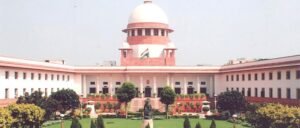Appeal Against AFT Judgment in High Court : SC
 Appeal Against AFT Judgment in High Court
Appeal Against AFT Judgment in High Court
Remedy of Appeal Against AFT Judgment in High Court ? The Armed Forces Tribunal (AFT) in India serves as a specialized forum for adjudicating disputes related to the armed forces.
However, aggrieved party can seek recourse through the writ jurisdiction of High Courts under Article 226 of the Constitution.
This article explores the process of appealing AFT judgments in High Courts under Article 226.
Article 226 and its Scope over AFT Judgments
Article 226 of the Indian Constitution empowers High Courts to issue writs for the enforcement of fundamental rights and for any other purpose.
This constitutional provision allows individuals aggrieved by decisions of tribunals to approach the High Court for the protection of their rights.
However, due to Section 31 of the AFT Act, 2007, High Courts were not entertaining the writ petitions against AFT Judgments.
What is Section 31 of AFT Act, 2007
Section 31 of the Armed Forces Tribunal Act, 2007, addresses the issue of appeals from decisions of the AFT.
It stipulates that an appeal against the order, decision, or award of the AFT may lie to the Apex Court, on questions of law, within a period of ninety days from the date of communication of the decision or order.
High Court Jurisdiction over AFT Judgment
When filing an appeal in the High Court against an AFT judgment, the petitioner typically challenges the decision on grounds such as errors of law, jurisdictional issues, or violation of natural justice.
Recently, the Hon’ble Apex Court in Union of India Vs Parasotham Dass (Civil Appeal No. 447/2023 decided on 21 Mar 2023) decided that the High Court can exercise its writ jurisdiction over AFT Judgment.
And High Court may examine the legality, regularity, and correctness of the AFT’s findings, taking into account Section 31 of the AFT Act.
Scope of High Court Over AFT Judgments
The High Court, in its scrutiny, can hold that the AFT had erred in interpreting certain legal provisions and had failed to consider vital pieces of evidence presented by the petitioner.
The High Court can also observe that the AFT’s decision was arbitrary and lacked a reasonable nexus with the facts on record.
Easy Approach to High Court by Litigant
Section 31 of the AFT Act, 2007 strengthens the legal recourse available to individuals before the Apex Court, if dissatisfied with AFT judgments.
However, The Union of India vs Parasotham Dass case underscored the importance of a robust judicial review process before High Court.
And High Court can ensure that the decisions of specialized tribunals are subject to scrutiny and correction when essential legal principles are overlooked or violated.
Not only Armed Forces Lawyer in Delhi but also other legal experts must be aware of this armed forces Judgments who are dealing with armed forces law.
Legal Experts in Delhi for Army Matters must update themselves on Army Act/ Air Force Act/ Navy Act and relevant rules and regulations.
Frequently Asked Questions
What is AFT’s role in India?
Answer: The Armed Forces Tribunal adjudicates service-related disputes concerning Army, Navy, and Air Force personnel in India.
Can a person appeal an AFT decision?
Answer: Yes, an aggrieved person can challenge an AFT judgment by approaching High Court under Article 226 of the Constitution.
What does Article 226 of the Constitution allow?
Answer: Article 226 empowers High Courts to issue writs for enforcing fundamental rights and correcting tribunal errors.
Why did High Courts initially avoid hearing AFT appeals?
Answer: Section 31 of the AFT Act led High Courts to refrain from entertaining writ petitions against AFT judgments.
What does Section 31 of the AFT Act provide?
Answer: Section 31 permits an appeal to the Supreme Court on legal questions within 90 days from decision communication.
Can High Courts now hear writs against AFT judgments?
Answer: Yes, after the 2023 Apex Court ruling, High Courts can exercise writ jurisdiction over AFT decisions.
What case allowed writs against AFT decisions in High Court?
Answer: The Supreme Court’s decision in Union of India vs Parasotham Dass (2023) allowed such High Court scrutiny.
Questions on Jurisdiction of High Court over AFT Order
What can petitioners challenge in High Court?
Answer: Petitioners may challenge AFT judgments citing legal errors, jurisdictional mistakes, or violation of natural justice.
What can High Courts examine in AFT cases?
Answer: High Courts can review the legality, regularity, and correctness of AFT’s orders and findings.
Can High Court correct AFT’s legal interpretation?
Answer: Yes, High Courts may find AFT misinterpreted law or ignored key evidence, warranting judicial correction.
What if AFT’s judgment is lacking reasonable connection with facts and law ?
Answer: The High Court may hold the decision is lacking reasonable connection with the facts presented.
What role does judicial review play in AFT appeals?
Answer: Judicial review ensures specialized tribunals like AFT remain accountable for legal and procedural correctness.
Can a litigant directly approach the High Court?
Answer: Yes, if legal principles are violated, litigants can file a writ petition before the concerned High Court.
What did the Apex Court say in Parasotham Dass case?
Answer: The Court confirmed High Courts have writ jurisdiction to review AFT decisions under Article 226.
Why should Army law experts stay updated?
Answer: Army lawyers must stay informed on AFT rulings and military laws like Army, Navy, and Air Force Acts.
